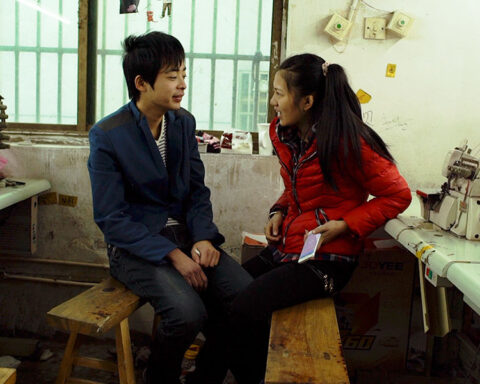Last Train Home is an intensely moving documentary about the migration of peasants across China’s vast terrain. It’s the first feature doc by Lixin Fan, a Chinese-Canadian filmmaker now living in Montreal and working with that city’s acclaimed EyeSteelFilm group. Fan’s film captures the chaotic nature of China’s Spring Festival so well that it’s surprising to discover that he never experienced the country’s remarkable migratory flow as a youth.
“My father was a college professor and my mother, an accountant,” recalls Fan. “I went to university in my hometown. I didn’t have a chance to travel until I worked as a cameraman at CCTV [China Central Television]. I was constantly troubled and often grieved by the shocking poverty and misery across the country’s vast rural land, submerged under the glamour of the modern metropolis.
“I started to think that the country’s millions of migrants were the very foundation of today’s prosperity, yet they were denied many basic social necessities. They all bear this great grief of constant separation from their beloved families. I then decided that I had to make a film to document this special group against the backdrop of a unique era in this changing country.”
The migration of the peasant work force started in the early ’80s when China first opened its market and economy. The influx of foreign investment created numerous factory towns in the coastal regions. A soaring demand for labour lured millions away from their farmland in the undeveloped inland provinces to work in these factories. With the loosening of the country’s long-standing household registration system, people started to move around to find opportunities to move up the social ladder. For the migrant factory workers, low wages and the lack of basic social rights prevent them from bringing their families with them to live in the cities. Thus every year, before the Chinese New Year, some 200 million people have to travel thousands of miles home to see their families who were left behind on the farm. The journey takes about 30 hours on an express train; otherwise it might take up to three days.
The Spring Festival rush is more relevant to social policies than to an improvement of the transportation system. China has 900,000 km of railroad, which allows a maximum speed of 200km/hr. This is comparable to the railroad systems in most developed countries. The country also has a total of 40,000 km of highway, ranking second in the world after the US’s 88,000 km. Every year, a few weeks before Chinese New Year, 200 million migrant workers need to travel from southern coastal cities to rural inland villages, and after the holidays this torrent of travellers reverses. It is just impossible to transport such a large number of passengers all at once in one direction. A more rational solution would be the implementation of labour laws, granting migrant workers the social support they deserve, so that eventually they would be able to bring their families to the cities with them.
Fan was moved by the terrible plight of so many Chinese working families and decided to document their situation. “I want to make films that are sensitive, observant and provoke prudent free-thinking,” he says. Although he immigrated to Canada after working at CCTV, Fan was able to enlist his old friends to help him return to China to make Last Train Home.
They financed his first research trip to the factory towns in southern China, where he visited over 30 factories in the city of Guangzhou. Fan hung around the neighbourhood and talked to the workers. He eventually met with the Zhang couple, who came from a remote village in Sichuan province and had been working in Guangzhou for 17 years. In the beginning, they were cautious about exposing their family life, but with time, they became friends, and eventually the couple agreed to the shooting of Last Train Home.
Fan came to realize the importance of establishing an intimate rapport with his subjects. They spent a great amount of time together and became like family. “Many times I got great footage when I felt that I was with my subjects in their emotional world. I lived the moment with them. I felt their pain, their love, their sorrow and courage, but at the same time, I had to remain detached,” Fan elaborated.
“I made four trips in three years for the filming. I broke down the timeline into three periods: the first year was the parents’ first trip back home. The second year, the family trip was complicated by a snowstorm. The third year, they encountered a financial crisis. Story-wise, each trip has its place in the film. The first trip gives us the idea of mass migration and family separation; the second trip elaborates on the immense size of the migration and also steps up the family drama; and the third trip brings the global financial crisis into context and shows how it leads to the family’s further disintegration.
“There were times when I was caught by my own emotional involvement. For example, when the father lost control and got physical, should I put down the camera to help or should I capture and expose this emotional moment on screen, wishing to provoke a change of heart in my audience? A conflict of ethics against professionalism is always difficult and arguable. This is the ultimate question that every documentary filmmaker faces at some point. I strive for the best outcome but definitely not at the cost of harming my subjects. I ended up rushing into the frame to separate them. To me, they are more important than my shot.
“I admire the works of fellow Chinese film director Jia Zhangke,” he continues. “His calm, meticulous, sensitive, and abstract way of looking at China from a humanistic point of view in a greater historical context gives me a lot of inspiration. He uses landscape and environment to define the subject matter, as he explores the relationships between the common people and contemporary Chinese society. I also learnt a lot from my good friend, Yung Chang, the director of Up The Yangtze (UTY). His work demonstrates a unique understanding of cross-culturalism.
“Mary Stephen is another inspiration when it comes to cross-cultural perspectives. She is a Chinese-Canadian editor who lives in France, and has edited most of Eric Rohmer’s films. Her unique migrant experience gives her great insight into both Eastern and Western culture. She sees the world with a mixed perspective, which is perfect for my film.”
“I met Lixin at IDFA in Amsterdam, on the boat they rented for UTY,” comments Mary Stephen. “I was there doing sound and post-production work for the Turkish/Kurdish film My Marlon and Brando by Hüseyin Karabey. I was struck by Lixin’s sincerity and we kept in touch. When I was editing in China in May, 2008, Lixin was on his way to shoot a summer segment of his film. W We met quickly in a bar in Beijing, and there he popped the question, ‘Will you fine-cut my film?’ I am always game for a new adventure with people I trust, so I said yes. Lixin is always willing to learn. I Initially, we did not share the same approach to documentary filmmaking, but he is a fast learner and we saw eye to eye very quickly.”
“Mary has done a fantastic job in taking the film from its rough cut to the final version,” Fan adds. “She transformed the story by digging into our 250 hours of rushes in search of ‘hidden treasures’. She deconstructed each scene and reconstructed them. She decided to go with footage that might not be technically perfect, but had much more authentic dramatic emotional impact. She decided to extend the emotionally disturbing scenes. At first, I wondered if we had gone too far and people would say that we were exploiting the situation. She made me understand the difference between validity and exploitation. She told me, ‘Remember, you shot it; you must take responsibility’. It takes courage to face your responsibility honestly. Her edit decisions really helped to bring out the true essence of each scene. I learned a lot from Mary, not only about filmmaking but also about life!”
“On a personal level, I am a running joke at EyeSteelFilm, as the ‘migrant editor,’” laughs Stephen. “I have always travelled and worked far away from home, even when my three kids were very young. I raised them on my own, with the help of wonderful au-pair girls, and my children have always been my priority. My 19-year-old daughter plugs in Skype and watches me and Lixin work while she and her brothers go about their business at home in real time. The migrant workers are not as lucky as we are. If I had to wait to see my kids only once a year, I don’t know how I’d have survived. I think the Chinese migrant community is as much a phenomenon as any migrant community, be it Filipino or the Malians in France or the Turks in Germany. I It’s very hard; my heart goes out to them.”
The average age of these migrant workers is 28.6 years old. Sixty-one percent are between the age of 16 and 30, 24% are between 31 and 40, and only 16% are over 40, which indicates that the majority of the migrant workers are of child-bearing age. This poses the serious question of how to raise kids while the parents are far away from home. They cannot afford to hire nannies, so the job of raising their kids usually lands on the grandparents. Cross-generational care happens both in city and rural families. Grandparents are usually more lenient towards the kids, since most couples can only have one child. These kids are less disciplined under their grandparents’ care and they are often more defiant, which may translate into a collective force for positive change in the country. Yet they are extremely self-centred, inconsiderate and often bow to obstacles in life. Last Train Home explores this phenomenon, which was also portrayed in UTY. Both films took apocalyptic journeys across a haunting landscape amid the world’s fastest changing society.
It is true that the Confucian value of filial piety has long played a big role in Chinese lives. Being away from one’s family was never encouraged by traditional values, but a changing society somehow shifted and modified the value toward a more pragmatic approach of bettering one’s material life. Although the parents work away from home, they send all their savings to the grandparents for their kids. Sadly, what we learn from Last Train Home is that providing material comfort alone does not translate into filial affection. Without parental presence and emotional support for their entire childhood, the children do not connect or sympathize with their parents, as the gap between them widens into an irreparable split.
“My work allowed me to travel, so I did have a chance to see my family back in Wuhan, but not usually at Chinese New Year,” Fan recalls. “I haven’t spent a single Chinese New Year with my family in the past ten years; I’ve always been on a shoot somewhere. I’m used to it now, but I do miss them from time to time. I left home in search of better opportunities in life, just like the migrant workers. Nowadays, technology can somewhat help us overcome our homesickness. I utilize Skype with my family in China once every few days. It makes us feel that we are still close to each other. Whenever I really miss them, I get on Google map and search for my mom’s house. Watching the screen slowly zoom in on the house which chronicled all my childhood memories, I feel like I’m on my way back from school and mom is preparing dinner, with all my childhood friends running around playing games in front of our place.”
China has a comparative advantage in the global market because of her massive working population. These migrant workers make the ultimate sacrifice of their family lives to enhance opportunities for their children, and we in the West often don’t have the faintest idea about their loss. Soon, China will face a fast aging demographic and this massive migrant workforce will be a daunting burden for the government as it poses huge challenges from providing social care to filling job vacancies. With China’s “one-child” policy, the working population in the future is not likely to be enough to support the retirees. As Fan expresses it, “I wish to provide some insight into the real lives of those who manufacture what we consume, and give the world a new perspective on China’s social issues against the greater backdrop of the global economy. The situation is like a time-bomb and hopefully the Chinese government, aided by international policies, will be able to solve the problem before the clock stops ticking.”
From Last Train Home’s production to post, Lixin constantly sought advice from his colleagues at EyeSteelFilm, Up the Yangtze director Yung Chang, and his producers Daniel Cross and Mila Aung-Thwin, to analyse views from both western and eastern perspectives, determined to avoid common cliché. His collaboration with EyeSteel has been fortuitous. “I felt I needed to get more education here in order to find a decent job,” Fan recalls of his early days in Canada. “So I registered in a summer course by Peter Wintonick at the Canadian Screen Training Centre”.
Last Train Home was selected in a public pitching seminar in front of 150 competitors. Fan’s pitch didn’t win the first prize but it strengthened his belief in getting his film made. He went to HotDocs and met the producers of EyeSteelFilm when they were pitching Up The Yangtze at the Toronto Documentary Forum. They needed a soundman who could speak the local dialect and he was hired, which took him back to China just two months after he had landed in Canada. In China, he toiled side by side with Yung Chang on and off the cruise ship and his tireless effort earned him a deserving promotion from soundman to associate producer of Up The Yangtze.
“The production environment in China is completely different than that in Canada,” says Fan. “I benefited greatly from my former CCTV production experience. Also, with the help of my Chinese collaborator Qi Zhao (Last Train Home’s executive producer) and Yi Han from Beijing, the crew managed to overcome numerous difficulties in three years of filming. The film would never have gotten made without the support from them, and together with EyeSteelFilm in Montreal, I’m now developing my next project on the world’s largest windmill field being built in China.”











